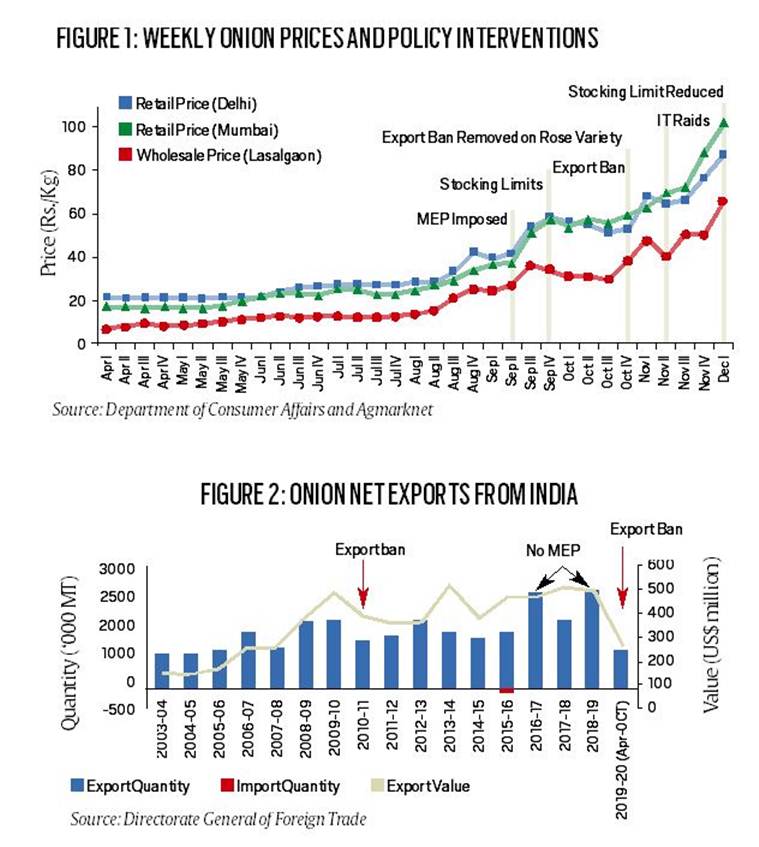- India
- International
Storage facilities for rabi onions must be created on a massive scale
It is time to wake up from the onion nightmare and work towards more sustainable solutions, rather than knee-jerk measures.
 The failure to control spiking onion prices (it has crossed Rs 100/kg in several retail markets) has become a nightmare for the central government. (Illustration: C R Sasikumar)
The failure to control spiking onion prices (it has crossed Rs 100/kg in several retail markets) has become a nightmare for the central government. (Illustration: C R Sasikumar)
The failure to control spiking onion prices (it has crossed Rs 100/kg in several retail markets) has become a nightmare for the central government. Interestingly, during this period, an old video of Prime Minister Narendra Modi criticising the then UPA government on the same issue has gone viral on social media. The PM is seen saying: “Now, we have to open lockers for onions too, and keep the onions locked in the house… [and] when guests come, they should only be served with its fragrance… This (UPA) government is capable of giving tears without onions. Look at their sins — their claws have snatched onions from India’s poor who used to survive by consuming bajra/wheat/jowar/maize rotis with onions. Those who have snatched away onions from the poor, there is a need to wipe away their sultanates from entire India.” Now, when he himself is in power and retail prices of onion have gone through the roof, PM Modi is silent.
This shows that while it is easy to criticise others, policy-making is a tough job that requires humility, a proper understanding of the issues and must be backed by resources and the implementation of a sound strategy in a sustainable manner. In this article, we discuss how future fiascos with regard to onions can be avoided.
 The current spike in onion prices could have been anticipated.
The current spike in onion prices could have been anticipated.
But let us first recount the trajectory of onion prices over the last few months. When retail prices touched Rs 50-60/kg in September-October, the government imposed minimum export price (MEP), put stocking limits on retailers and wholesalers and then banned onion exports. However, when these measures failed to tame onion prices, even income tax raids were conducted on traders (Figure 1). This shows the bankruptcy of ideas in policy-making. Such a situation has arisen almost every alternate year, but we have refused to learn. As finance minister, the late Arun Jaitley had announced and allocated Rs 500 crore for “Operation Green” in the 2018 Union Budget precisely to stabilise the prices of tomatoes, onions and potatoes (TOP). The scheme was to be implemented by the Ministry of Food Processing, but their website shows that the money has still not been released.
The current spike in onion prices could have been anticipated. The Horticulture Statistics Division had reported 7 per cent lower kharif acreage compared to the previous year (2.73 lakh ha) in major onion growing states (Maharashtra, Karnataka, Madhya Pradesh, Andhra Pradesh, Gujarat and Rajasthan). Due to heavy rains in September/October, almost 58 per cent of the kharif onions in MP, 18 per cent in Karnataka and 2 per cent in AP were damaged. Besides, continuous rains led to a delay in harvesting in Maharashtra. The government woke up to the problem late and directed MMTC to import 1 lakh million tonnes (mt) of onions. With relaxed fumigation norms, onions are being imported from Afghanistan, Turkey, and Egypt. The question is at what price MMTC will import the onions and dump it on the Indian market.

India is already the largest exporter of onions in the world with average exports of 2 mmt a year (figure 2). Instead of banning exports, it is better to keep imports open so that when domestic prices rise unduly, private trade can start importing rather than waiting for the government to take a delayed decision. This way, India can remain a reliable exporter, which will help farmers get better prices on a sustainable basis. Abrupt export bans are not only anti-farmer but actually reflect the failure of government policy. To take care of consumers’ interests, India needs to build proper value chains as envisaged under “Operation Green”.
So, what needs to be done to safeguard the interests of farmers as well as consumers? First, storage facilities for rabi onions must be created on massive scale, both at the farmers’ end as well as with traders. When prices were hovering around Rs 4-5/kg in April-May, the government could have purchased onions at, say, Rs10/kg and stored the stock in modern, private-sector godowns. However, repeated stocking limits and raids discourage private investment in modern cold storages. For encouraging private storages, the Essential Commodities Act has to go, and if traders collude, let the Competition Commission of India (CCI), and not income tax officials, look into this.
Second, the government needs to promote the use of dehydrated onions (flakes, powder, granules) among urban households and bulk consumers (armed forces, hospitals, hotels and restaurants, etc). As onions are sensitive commodities, the government should also keep a buffer stock of dehydrated onions, which have a much longer shelf life. Also, 1 kg of dehydrated onion equals 10 kg of fresh onions. This is the right time to promote their use. With more than 100 units, Mahuva in Gujarat is already a hub for the dehydrated onion industry. But with low international demand and negligible domestic demand, these units have high pile up of the previous year’s stocks. On the contrary, Jain Irrigation emerged as the largest dehydrated onion company in India engaging small and marginal farmers on contract. The price to be paid to growers is assured by the company even before planting. And if the market price after harvest is higher than the assured price, then farmers get a price that is 60 paise/kg less than the market price. Such models of contract farming reduce market risk and need to be scaled up.
Third, small and marginal farmers should be organised in Farmer-Producer Organisations and direct buying by organised retailers should be encouraged through contract farming, bypassing the mandi system. Additionally, market reforms along with overhauling the infrastructure of existing APMC mandis are required. After over five years in office, the Modi government has missed the golden opportunity of carrying out APMC reforms in the large number of states it ruled, and this opportunity is slipping further by the day. Without that, the prospects of unified national markets, stabilising prices or ensuring a fair price to farmers and consumers are bleak.
It is time to wake up from the onion nightmare and work towards more sustainable solutions, rather than knee-jerk measures.
This article first appeared in the print edition on December 23, 2019 under the title “Some onion lessons”. Gulati is Infosys Chair Professor for Agriculture and Wardhan is consultant at ICRIER.
40 Years Ago
EXPRESS OPINION
More Explained
May 14: Latest News
- 01
- 02
- 03
- 04
- 05









































